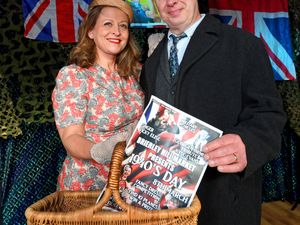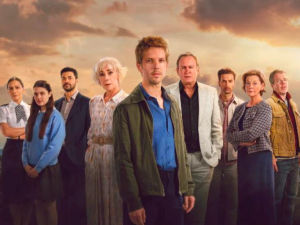Levison Wood talks ahead of Birmingham show
While most blokes get home from work, crack open a tinnie and settle down in front of the box – stopping off in the kitchen for a microwavable ready meal, of course – Levison Wood has a different routine.
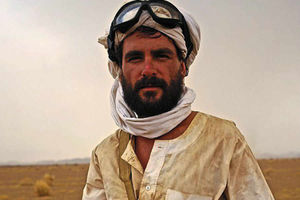
A typical day in the life of the former British Army officer and explorer might find him walking 20 miles through a snake-infested jungle before negotiating with local war lords or asking drug barons for a safe passage.
When he finds a bed for the night – actually, that's wrong, he usually finds a floor – he'll take out his journal and write about the day. And then, the following day, he'll do it all again, walking into the dark heart of Africa, the scintillating interior of South America or the exquisite peaks of the Himalayas.
Levison laughs. "It's not what you might call a stable life. It's quite difficult to do the things that other people normally do because I'm usually home for about three months then I'm off again for nine months or a year. But we all make sacrifices and I feel very privileged to do what I do."
Chatty, personable and the acme of BLOKE, Levison will return to his native West Midlands on February 22 to talk about his expeditions. He'll be starring in An Evening With Levison Wood at Birmingham Town Hall for an amusing and poignant sharing of stories.
The TV star, whose Walking The Americas show aired on Channel 4 in January, will focus on his recent 1,800-mile walk along the length of Central America.
"I'll be chatting about my latest expedition. After the previous one, I came back and started contemplating where to visit. I'd not spent much time in Central America and it seemed like a good idea to go to an area that I'd not visited much. I'd done a little travel there during my time in the Army, where we did jungle training. So I thought I'd use the same concept of walking 20-25 miles per day to explore an area that's unseen."
Levison started exploring for one simple reason: the love of it. It also gave him the opportunity to develop two other loves: writing and photography. Born in Forsbrook, a village in Staffordshire, wanted to articulate the beauty and challenges of some of the world's most remote areas. And so he became an explorer.
"I enjoy photography. That's always been my passion. That's what I've been doing for a number of years. I love to write, too, whether that's writing a book or a script for TV.
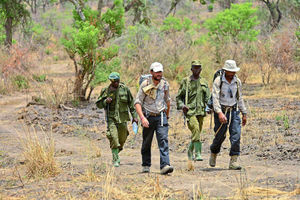
"Being in remote areas on expeditions gives me the opportunity to do that. For me, the important thing about my books or TV programmes is to try and challenge a few stereotypes. We see places like Central Asia or Central America and you have these ideas of what they will be like. There's lots of negative stuff in the media. Central America, for instance, is written off as being a place full of drug cartels and gangs. Of course, there's no smoke without fire and some of that stuff happens. But the rest is incredibly beautiful. Most of it is absolutely stunning."
Though Levison tries to prepare for all eventualities, he takes each day as it comes. He'll hook up with a guide, but when he spends a year on the road he'll meet new people each day. That immersion in local culture is one of the things he enjoys most.
"I meet all sorts of people. I love the diversity and the contrast from day to day. One day I'll be meeting the local mayor or governor or even the Dalai Lama. Other days I'll be walking with shepherds or local guides. I think by travelling on foot and walking, that tends to be how a lot of people get around. In remote areas, there aren't any roads. So by travelling at the same speed and in the same way you can interact with locals.
"I find it incredibly important to have a local guide who can speak the language so that I know what's going on. In Central America, I had a local guy called Alberto, who was a fashion photographer. He'd not travelled to some of the places we visited but he spoke the language so he came along."
Levison sees remarkable sites and encounters considerable personal danger. Though he's Alpha Male, Mr Beefcake, Harder Than Nails and all of that, even he gets a little nervy from time to time. He laughs: "Of course I do. In places like Honduras we were walking through gangland areas and I was meeting gangsters. A lot of these lads were barely out of their teens and they were professional assassins. In those situations, you don't know who's trustworthy or who's high on drugs. The biggest danger is the young lads with guns who've had a few drinks. That's where you have to anticipate what might happen.
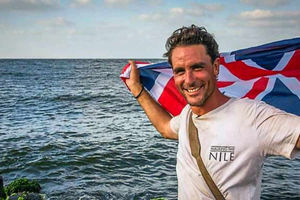
"It's scary, sometimes. But then you can be in the remote jungle and be three or four days from the nearest village.
"If you break a leg or get bitten by a snake, you're not going to get out of there alive. So you have to learn how to deal with that stress. The Army gave me a good understanding of what's dangerous and what isn't. It taught me about my limits and how to push the boundaries. I've always travelled since I was a kid. I've always gone on my own. That gave me a general understanding of the world. Generally people are good. It's just about finding the balance and minimising risk."
Though Levison always travels with a plan, he can never be sure how things will pan out. And so while he might have an intention to reach a particular visit for the night, there are no Premier Inns for him to book into. A lot of his travels are predicated on the human kindness of others.
"The fact that you can travel is great. But I never plan where I'll stay the night. I walk for 20/25 miles but I can't book hotels. You just hope for the best. There's been a couple of times where I've struggled to find anywhere. But generally speaking, you'll turn up in a village and someone will let you sleep on the floor or in a school house. You can travel anywhere in the world and not sleep in a ditch, it's remarkable. I remember when I was 22 and I hitchhiked from the Midlands down to India. I travelled through 25 countries over five months and I only spent £700."
Levison's background in Staffordshire provided him with a firm foundation for his life as an explorer. He didn't travel far when he went to Uni, attending Nottingham, where he completed an Honours Degree in History.
"I've always been a Midlands lad. Forsbrook was important because it is on the edge of Staffs Moorlands, close to Peak District. As a kid, I was forever going out exploring the Peaks and that probably had a good impact on me. I had that insight into nature, I liked camping and being in the outdoors and I took it step by step onto the next level."
As a teen, Levison started exploring Europe. A gap year followed – more travelling, who'd have thought it – before he served in the Parachute Regiment, where he became an officer. He travelled the world, serving in Afghanistan, Helmand, Kandahar and Zabul, among other parts of the world. And then he set about exploring. Throughout his life, travel has been the constant.
"I've travelled 100 countries now so to choose the best place is tricky. My philosophy is that you can go to the most beautiful place in the world but if you're not with great people you don't have a great time. Conversely, you can go to a dump and have a great time if you're with the right people. So it's all about travelling with people you like. That defines the experience.
"A couple of places that stand out would be South Africa, particularly Cape Town, which is among my favourite cities. Nepal is beautiful too and I do love the mountains."
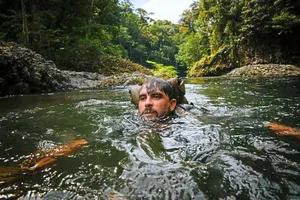
Levison left the regular Army in 2010 and took time to decide what to do next. He'd wanted to became a writer and pen his own book. To achieve that, he realised he had to do something big and epic to win the attention of publishers. So he conceived a trip to walk the Nile, which became a TV programme for Channel 4 and a best-selling book.
"The idea came to me because I was chilling out and travelling around after I'd left the Army. I'd volunteered for a charity driving ambulances from the UK down to East Africa. The one handrail through that massive expanse of Africa was the River Nile. So I thought it would be amazing to do the journey on foot because there was scope to go to some fantastic places."
It took about two years of planning to get the funds, make the right contacts and do the background work. But, before long, he was off. "Once you step off, that's the easy bit, even though it was the best part of a year walking. I was relieved once I'd got everything in place to get going. But it was hard, mentally and physically. There are all sorts of problems with wildlife, political challenges, a civil war in Sudan . . . Even so, it was worth it.
"When you're on expedition, for the first three months everything is new and novel and exciting. But if you're doing anything, particularly something as repetitive as walking, you get tired of it, physically and emotionally. A journalist, Matthew Power, came out and died from heat stroke, which had a big impact. Then my guide couldn't continue because he couldn't get the right visa. By the time we arrived in Sudan, I was ready to go home but I wasn't halfway through it. But in moments like that, you draw on your inspiration. I'm just a pedestrian passing through these places. A lot of people have to live there and it's incredibly tough, so, really, I can never complain about any of it."
Levison didn't expect to become a TV star. That came as a bonus. He wanted to write but having drawn up his plans he was approached by Channel 4. "It was a brilliant opportunity. These expeditions are about combining my passions, writing, photography and now TV. You can retell the same story. I keep a journal when I'm on the way. The real writing begins when I get home. The publishers want to get the books out in six weeks – so I write 80,000 or 90,000 words in a short space of time.
"When you see the book on the shelves, that's special. Of course, it's a condensed version of what happened. But it's very special."
He enjoys his speaking tours, too, and looks forward to meeting fans at places like Birmingham Town Hall. "There's only so much time during those talks and what you can show is pretty brief. But it's a great opportunity to share the story and inspire others."
His work has turned into one of Britain's most sought-after bachelors and he's become something of a pin-up. He laughs, self-deprecatingly, and makes light of it.
"I don't take that too seriously. It's very flattering. But what can I say . . ."
He can say nothing. It is what it is.
Besides, Levison doesn't have time for the attentions of women seeking HunkMan. He's too busy pouring over maps so that he can find his next challenge.
"I've got a few ideas in the pipeline," he says. "But it's all under wraps for now."
Under wraps it may be, but one destination that's firmly fixed in his diary is Birmingham. "I love Brum. I'm looking forward to it."
As are Levison's fans.
An Evening with Levison Wood is at Birmingham Town Hall on Wednesday at 8pm. Tickets at www.thsh.co.uk


